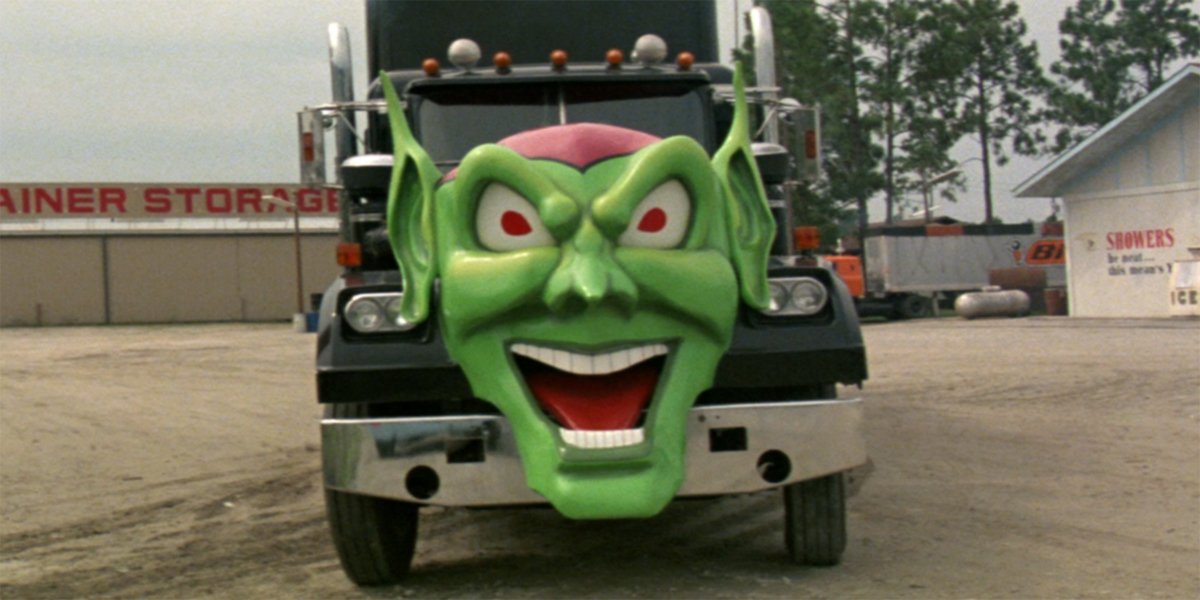That stated, I have to impale myself on the fence in judgment of the movie, because it’s one that causes the two halves of my brain to go to war. One always searches for the merits every time I watch, including the wonderful extreme tone and memorable set pieces, and the other can’t ignore just how ridiculously and inexcusably messy it is.
Accepting the tonal change from “Trucks,” it’s a foolish exercise to dismiss Maximum Overdrive as a “bad horror movie” because that’s only an examination of half its vision; it fails to recognize how legitimately funny the film is (something that Stephen King telegraphs in the opening scene where he makes a cameo as a man textually declared an asshole by his bank’s ATM). The comedy doesn’t really come through the characters or the dialogue, but instead it’s more about the movie’s hyper self-awareness of its silly premise involving 16 wheelers in a stand-off against heavily armed occupants of a North Carolina truck stop. Appreciation also demands darker sensibilities, and the ability to laugh when a little leaguer gets annihilated by a steamroller – but that’s really something that every Constant Reader needs to be equipped with in order to fully engage with the author/filmmaker’s work. In King’s own words (from Kingdom of Fear: The World Of Stephen King),
A friend of mine said you know you’re being scary when you can feel the malevolent grin begin to creep up your face – and he’s right. Humor and horror are close together. Both come from the same aggressive impulse and in both cases we laugh or scream because we’re happy it isn’t us.
As though the ending of Carrie, the plot of Firestarter, and the presence of The Trashcan Man in The Stand didn’t demonstrate it clearly enough, Stephen King also further exposes his inner pyromaniac with Maximum Overdrive. From flipping tractor-trailers, to RPG-exploded semis, to the Dixie Boy Truck Stop going sky high, King clearly loved blowing shit up sitting behind the camera, and that joy comes across in every screening.
What’s ultimately pretty shocking about Maximum Overdrive is that, of all things, it’s the writing that lets the movie down. One can rattle off a variety of excuses for it – a few examples being the fact that Stephen King was juggling several projects at the time, the pressures of a directorial debut, and King’s growing substance abuse issues – but regardless there is just a lot about the film that feels haphazard and undercooked. The characters all have the author’s familiar flavors, from the hunky short-order cook with a dark past (Emilio Estevez), to the corrupt and exploitative boss (Pat Hingle), to the smart and empathetic teen (Holter Graham), but they’re thinly drawn and the story never provides opportunity for the audience to form a deeper connection with them.
It further hurts to recognize that Maximum Overdrive is eternally frustrating in its utter lack of rules or consistency. If you’re making a movie where the trail of a comet makes all machines on Earth come alive, that’s something you have to commit to – but there are plenty of machines throughout the story that inexplicably perform without any issue, the most notable being the sedan driven by Connie (Yeardley Smith) and Curtis (John Short) in their introductory car chase, and the motorboat that allows the surviving heroes to escape to safety at the end. There is a line drawn between suspension of disbelief and bad writing, and Stephen King’s film is on the wrong side of it.
King made the unfortunate mistake of negotiating a summer release date for the film, agreeing to be heavily involved in the marketing and publicity in exchange, and it wound up being a box office failure. The movie did, however, find a cult following early in its existence thanks to it constantly playing on cable television, and watching it now it’s easy to understand why: dumb as it may be, it’s a lot of fun. Between its blaring AC/DC filled soundtrack and the Green Goblin-headed Happy Toyz truck, it has certainly left its stamp on pop culture, and while one could say it’s not fully functional as a movie, it’s a solid and memorable experiment with Stephen King as a director.
